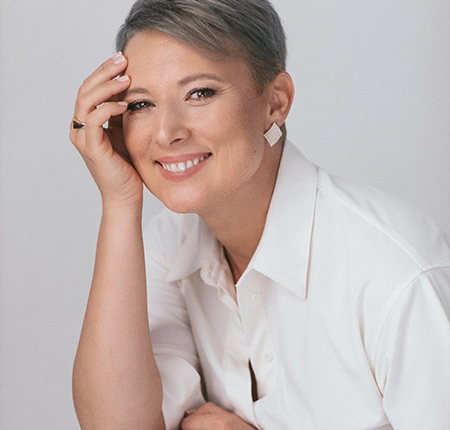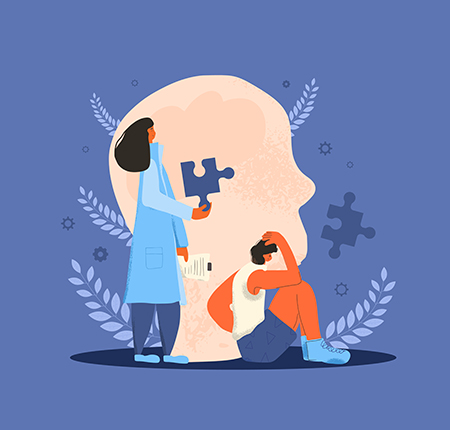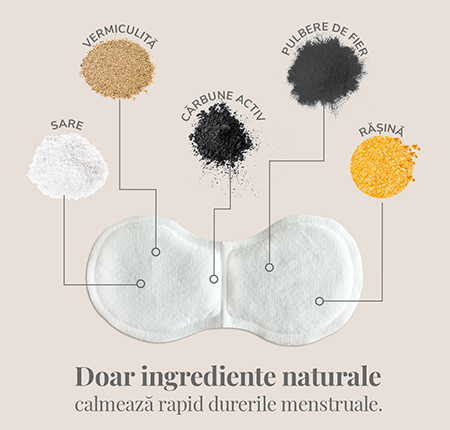
For some people, menstruation and the days leading up to it are far from the easiest times, no matter how much we'd like to believe what the adverts talking about the menstrual cycle say: no, some women don't feel like they're floating on a cloud when they wear a tampon (although a 100% organic cotton tampon lets the skin breathe and doesn't cause allergies or infections)!
You can feel, however, in a rollercoaster: from a state of severe fatigue to anger, the desire for isolation and even states of anxiety or depression. You may lose control of your emotions. And if you're experiencing this every month, you might be going through something more than just PMS. In medical terms, there is a less visible period condition that has a negative impact on your mental health: Premenstrual Dysphoric Disorder.
We too have had a lot of questions about what happens with these states, and more than that, we want to help you understand better! And for that, we asked a specialist. This is what I told Dr. Psychologist Raluca Anton.
Mental health and the menstrual cycle
"My academic background and training make me want the approach I have to always be informed by science and studies that attest to the quality of information. In addition, the idea of empathy and human connectivity directs me to an approach strongly centered on interpersonal relationships, on the basic need for connection and emotional safety in relation to those around us, safety which, if achieved, can bring major benefits .” (Dr. Raluca Anton)
Dr. Raluca Anton is trained in cognitive behavioral therapy, with doctoral studies completed in the Department of Clinical Psychology and Psychotherapy, UBB. He has published countless scientific articles, is co-author of some books in the field of psychology, holds professional training courses for psychologists and is part of the first group of therapists who have the IMAGO training in relational therapy in Romania.

And because menstruation can drastically affect our mental - and physical - health, especially when we don't recognize what's going on in our bodies, we asked her how we can take better care of ourselves this time of the month.
ENROUSH: How can we listen to our body better/more carefully?
Dr. Raluca Anton:
I think the healthiest thing we can do is to have a daily practice of being attentive to our own body's reactions. A good exercise is to give ourselves a check-in at the beginning of each day by simply asking ourselves the question: how do I feel in my body now? And maybe a check out at the end of the day by asking us the same question. Stopping throughout the day and paying attention to ourselves would be a next step in knowing the body's reactions.
When PMS means more than cramps and sore breasts—and you're going through unexplained bouts of depression and anxiety every month, we can talk about premenstrual dysphoric disorder (PMD). 1 in 20 women suffer from the condition, and symptoms can vary from person to person, although mood swings, sudden sadness or sensitivity to rejection, irritability or anger, depression, low self-esteem and increased anxiety are common.
ENROUSH: How can premenstrual symptoms affect our quality of life?
Dr. Raluca Anton:
Beyond the physical malaise, PMS comes with an emotional malaise. Most of the time we are talking here about a much lower tolerance to frustration than in other periods of the month, anxious symptoms that can also appear as a consequence of the somatic reactions that occur during this period (for example, a tightness in the chest, a shallow breathing, weakness in the limbs) and a depressed mood. All this is also related to the personal history of each of us and the predisposition we have towards one emotional category or another. Together with these states, the interactions we have with those around us also change, but also our abilities to deal with the situations we go through, increasing the chances of making errors in our professional life, for example.
How do you manage mood swings?
When we talk about problems related to menstruation, premenstrual dysphoric disorder is often an invisible condition: the causes are unknown and there is no treatment, and the symptoms can be ignored or, even worse, considered "packaged" with that time of the month, which which only perpetuates the stigma and shame associated with menstruation.
Which brings more problems on the mental health side. Because diagnosed or not, premenstrual dysphoric disorder is a challenge for people with periods in all aspects of life: it affects us at work, when we socialize and in relationships. In some cases, symptoms can be so severe that they lead to suicidal thoughts. Knowing how to take care of ourselves can be vital in such situations!

ENROUSH: How can we recognize mood swings and bring ourselves into a present, grounding state?
Dr. Raluca Anton:
The better we know our body and our body's reactions not only during difficult times, but also in everyday life, the more we manage to be present in our somatic story. We recognize mood swings more easily, and in recognizing these changes, the best step we can take is to go into the "grounding" zone - a state of presence or anchoring in the present moment.
For each of us, this state of presence can be achieved in different ways. A classic technique that we use in the office is the breathing technique in four times: inhale to the count of 4, hold to the count of 4, exhale to the count of 4. It is a technique that helps the body to be here and now.
ENROUSH: How do we manage irritability or anger?
Dr. Raluca Anton:
The best thing we can do is focus our attention on the resources we have in those moments: that means going for a walk, doing those grounding exercises, that means having a conversation with someone close to you.
Another way we can manage our irritability or anger, especially in our interactions with others, is to take care of our relationships. Anger is one of the biggest phenomena that erodes a relationship. Especially in the context of menstruation, it's important to tell others "I'm at that time of the month, and you know I'm not very comfortable, I have these hormonal changes that might make me irritable."
This predictability that we build in our interactions with others helps them not to put straws on the fire, but to come with validation for our states and what happens to us.
ENROUSH: Is mental health important to the menstrual cycle? How can we let go of our prejudices so that we take our symptoms seriously?
Dr. Raluca Anton:
Mental health is extremely important for the menstrual cycle. We already have specialists who tell us that taking care of the states we have, of the body's reactions - lead to better emotional and relational health. Connecting with your own body, paying attention to how it manifests itself are things that would be essential to do every day, even more so during menstruation, when we know there are mood swings.
Definitely, we come with a lot of prejudices. But the menstrual cycle is normal, just as pregnancy is normal.
Women have had periods since the dawn of time, why make a tragedy out of it? First, we make a "tragedy" out of it precisely because we now, in the present, know that there are solutions.

There are ways we can feel better during this time, and there's no need to grit our teeth, yearning for well-being. There are states that offer days off during menstruation to support women, which helps with emotional and physical health. Without taking advantage of the length of menstruation, these days can be resources for us and to feel better in our own body.
ENROUSH: So how can we set boundaries with those around us (family, colleagues, friends) when we need time and space or ask for support and help when needed?
Dr. Raluca Anton:
Most of the time, we end up setting limits when we are suffering. Then the limits are set in an abusive way, either through not talking or through anger. I think it is not useful to set these limits during an emotionally difficult period, but rather during the rest of the time, on the principle of "striking the iron while it is cold, not while it is hot" so that the information we convey to those in I swear to sit down. If we convey them in a highly emotional moment, we will most likely do so in a way that will not reach others.
I think the best thing we can do is have open conversations with those around us about what's happening to us - both emotionally and physically - without being ashamed or feeling like there's something wrong. with us.
How we manage menstruation
Whether we're talking about PMS or PMDD symptoms, there must be things we can do to make our periods feel better. For example, lifestyle changes, avoiding certain foods or substances, grooming rituals or breathing techniques.
ENROUSH: What would be some tricks? What kind of activities are good for mental health before, during and after menstruation?
Dr. Raluca Anton:
The most beneficial activities we can do are activities that involve being with ourselves, understanding what is happening to us, and connecting effectively with those around us. By doing these pendulum exercises between our inside and outside, anxiety and the intensity of reactions are reduced over time. They do not disappear, but decrease in intensity and frequency.
It is an intervention that we do in the long term and the effects are seen as we practice and learn how to be as integrated as possible in ourselves and more connected with ourselves.
Current solutions for healthy menstruation
When it comes to current solutions, the advantage you have today is that, on the one hand, you no longer have to grit your teeth when you don't want to take pills for cramps: there are thermal patches that give you comfort for up to 8 hours, only with natural ingredients.

And in addition to all these tips, what you use month after month to manage bleeding matters, because the products can have an impact - both negative and positive - on the health of your body. And our advice is to always choose safe, sustainable, natural and organic products that are not only practical and do not pollute nature, but give you the comfort you need and the assurance that they will not cause you irritation or infection, as they can scented or chemically bleached menstrual products.























